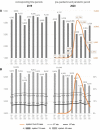Analysis of Nationwide Stroke Patient Care in Times of COVID-19 Pandemic in Germany
- PMID: 33356382
- PMCID: PMC7834653
- DOI: 10.1161/STROKEAHA.120.033160
Analysis of Nationwide Stroke Patient Care in Times of COVID-19 Pandemic in Germany
Abstract
Background and purpose: Since the beginning of the coronavirus disease 2019 (COVID-19) pandemic, many countries have introduced strict hygiene measures of social distancing to prevent further spreading of the disease. This may have led to a decreased presentation to hospital of patients with acute medical conditions and time-dependent management, such as stroke.
Methods: We conducted a nationwide cohort study using administrative database of all hospitalized patients with main diagnosis of acute ischemic stroke (AIS), transient ischemic attack, or intracerebral hemorrhage. Data from a total of 1463 hospitals in Germany were included. We compared case numbers and treatment characteristics of pandemic (March 16 to May 15, 2020) and prepandemic (January 16 to March 15, 2020) cases and also with corresponding time period in 2019.
Results: We identified a strong decline for hospitalization of AIS (-17.4%), transient ischemic attack (-22.9%), and intracerebral hemorrhage (-15.8%) patients during the pandemic compared with prepandemic period. IVT rate in patients with AIS was comparable (prepandemic versus pandemic: 16.4% versus 16.6%, P=0.448), whereas mechanical thrombectomy rate was significantly higher during the pandemic (8.1% versus 7.7%, P=0.044). In-hospital mortality was significantly increased in patients with AIS during the pandemic period (8.1% versus 7.6%, P=0.006).
Conclusions: Besides a massive decrease in absolute case numbers, our data suggest that patients with AIS who did seek acute care during the pandemic, continued to receive acute recanalization treatment in Germany.
Keywords: Germany; coronavirus; diagnosis; hygiene; thrombectomy.
Conflict of interest statement
Dr Eyding has received travel grants from Boehringer Ingelheim and Bayer Vital and grants for the realization of scientific meetings by Bayer Health Care, Boehringer Ingelheim, Sanofi Aventis, and Pfizer. Dr Weber has received speaker honoraria from Medtronic/Covidien and Bristol-Myers Squibb and from serving on a scientific advisory board of Medtronic. Dr Bartig has received orders for analysis of the German Diagnosis-Related Groups system from Boehringer Ingelheim and Sanofi Aventis. Dr Grau has received public funding by the Innovationsfonds des Gemeinsamen Bundesausschusses. Dr Hacke has received speaker and consultancy honoraria from Boehringer Ingelheim, Medtronic, and Cerenovus and a research grant from Boehringer Ingelheim. Dr Krogias has received speaker honoraria or travel grants for scientific meetings from Bayer Vital and Daiichi Sankyo. The other author reports no conflicts.
Figures

References
-
- Deutsche Gesellschaft für Neurologie. Das Phaenomen der leeren Stroke-units waehrend der Corona-Krise. https://dgn.org/neuronews/journal_club/phaenomen-der-leeren-stroke-units.... Accessed October 10, 2020
MeSH terms
LinkOut - more resources
Full Text Sources
Other Literature Sources
Medical

